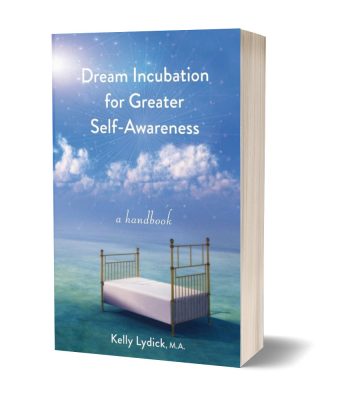Dream Incubation is a process that has been used by cultures worldwide for thousands of years. The Greeks, the Egyptians, and many others, all revered dreams and the process of engaging with dream content as a way of being part of the greater reality of life. These cultures held in high regard the information that came from dreams, and used that information to inform their choices about the waking life.
What ancients knew then, we are now able to use in a more modern and updated way that still works well with modern life. Psychologists have since studied the Dream Incubation Technique and have documented in clinical studies the validity of this technique (Delaney, 1976).
Dream Incubation, in part, is a process for setting intentions about a specific question, inquiry, or desired action. Intention setting is different than trying to control outcomes because with intention setting, you’re allowing the appropriate result to come to you when you ask.
Intention setting often employs what Buddhists would call “non-attachment” because when you set an intention, you remain unattached to any outcome or answer that occurs. This means that sometimes the exact desired result may not occur for you, but that engaging with the deeper parts of the self (higher self or subconscious) brings the correct result for any given question. The reason for this is that the conscious mind may not already know the exact result, even if the higher self or subconscious mind does.
Incubation can be used as a question and answer dialogue process between you and the deeper parts of the psyche, which have access to the collective unconscious and already know the answer to the questions you are seeking.
The Dream Incubation process is a series of steps that you can do right before you retire to sleep. It can be used as often as you like, and even every night if you wish. The more you practice the incubation technique, the more the results will build momentum and you will find that your answers will arrive rapidly in response to your questions.
Dream Incubation also includes the process of recording dream content in a journal. Keeping a journal allows you to track dreams and patterns, work with dream symbols, and more.
Keeping a journal to record the details of your dreams is the final step in the Dream Incubation process.
The power of Dream Incubation cannot be underestimated. It’s astonishing what can be achieved through this process and the wisdom that we can access through dreams.
For example, a profound dream that I had after my son’s birth detailed what was needed for birthing recovery. I had an emergency c-section and the recovery was difficult. I decided to use Dream Incubation to inquire what I needed to help the recovery process. In just one night, I dreamed of a vague dream with few details, but one specific word: “panchakarma.” I knew that panchakarma was an ancient Ayurvedic technique of detoxification, but I had never done it before.
 After I heard the word in the dream, I decided to try it. It helped my recovery immensely.
After I heard the word in the dream, I decided to try it. It helped my recovery immensely.
My clients also report profound results using the Dream Incubation Technique, especially when used in an iterative way.
I have had them share that the Incubation process has resulted in greater insights into relationships, creative projects, major life decisions such as whether to move house or start a new job, health issues, and more.
Want to learn more about this powerful process? Check out Dream Incubation for Greater Self-Awareness here.
About the Author
 Kelly Lydick, M.A. is author of Dream Incubation for Greater Self-Awareness. She holds certifications as a Meditation Facilitator, Life Coach, and Gateway Dreaming™ Coach. She teaches writing and personal growth workshops, and offers private consultations through her company Waking the Dream.
Kelly Lydick, M.A. is author of Dream Incubation for Greater Self-Awareness. She holds certifications as a Meditation Facilitator, Life Coach, and Gateway Dreaming™ Coach. She teaches writing and personal growth workshops, and offers private consultations through her company Waking the Dream.
Kelly’s writing has appeared in magazines such as Guernica and The Rumpus, and her work has also been featured on NPR’s The Writers’ Block (KPFA) and on the Word podcast (KJZZ).
Generally, we develop our brains our whole lives. As I get older, I find I’m slowly switching to using more of my intuitive powers. Something that I may be grappling with, or confused about, becomes instantly crystal clear shortly before waking. I can feel a complex issue quickly sort, sift and funnel it’s way into clarity!
I wonder if it’s actually more common than not for us to shift to this far more expedient, accurate and powerful way of functioning as we age?
Hi Laurie,
Great observation! I’ll answer as best as I am able… There are many studies about aging and the brain, some which indicate physiological changes that impact memory and cognition.
https://www.ncbi.nlm.nih.gov/pmc/articles/PMC2596698/
This study has shown that the hippocampus shrinks alongside the other areas of the brain that also shrink with age.
We do know that the hippocampus plays a role in dreaming and in memory function, too.
https://www.ncbi.nlm.nih.gov/pmc/articles/PMC7279884/
A 2010 study at North Carolina State University, though, indicated that age didn’t negatively impact intuition; that intuition wasn’t something that decreased with age. It held steady in common across people of all ages. So this lends to your experience.
https://news.ncsu.edu/2010/06/wmshessdecisionmaking/
I do see that many people have profound insights in the hypnopompic state, coming out of the dream state, and more recent studies show that dreaming is more holistic than we once thought.
https://pubmed.ncbi.nlm.nih.gov/28394322/
Personally, I align with Carl Jung’s ideas about dreams and their access to what we know as the collective unconscious, and that these connections are often more readily available in the hypnopompic state. Jung had some specific ideas about the positive aspects of aging, too. 🙂
https://jungiancenter.org/enjoying-the-afternoon-of-life-jung-on-aging/
Perhaps try incubation before you retire to sleep if there is something that you wish to attune to. You absolutely can hone your intuition with dream incubation. Just don’t forget to keep a log in your journal so you can track your progress!